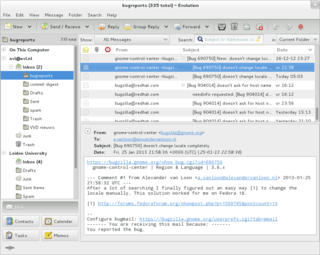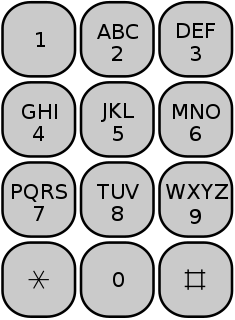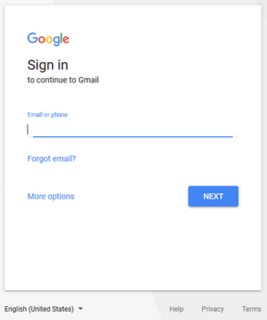
Electronic mail is a method of exchanging messages ("mail") between people using electronic devices. Invented by Ray Tomlinson, email first entered limited use in the 1960s and by the mid-1970s had taken the form now recognized as email. Email operates across computer networks, which today is primarily the Internet. Some early email systems required the author and the recipient to both be online at the same time, in common with instant messaging. Today's email systems are based on a store-and-forward model. Email servers accept, forward, deliver, and store messages. Neither the users nor their computers are required to be online simultaneously; they need to connect only briefly, typically to a mail server or a webmail interface for as long as it takes to send or receive messages.
The Simple Mail Transfer Protocol (SMTP) is a communication protocol for electronic mail transmission. As an Internet standard, SMTP was first defined in 1982 by RFC 821, and updated in 2008 by RFC 5321 to Extended SMTP additions, which is the protocol variety in widespread use today. Mail servers and other message transfer agents use SMTP to send and receive mail messages. Proprietary systems such as Microsoft Exchange and IBM Notes and webmail systems such as Outlook.com, Gmail and Yahoo! Mail may use non-standard protocols internally, but all use SMTP when sending to or receiving email from outside their own systems. SMTP servers commonly use the Transmission Control Protocol on port number 25.

SMS is a text messaging service component of most telephone, internet, and mobile-device systems. It uses standardized communication protocols to enable mobile devices to exchange short text messages. An intermediary service can facilitate a text-to-voice conversion to be sent to landlines. SMS was the most widely used data application at the end of 2010, with an estimated 3.5 billion active users, or about 80% of all mobile subscribers.

Spamming is the use of messaging systems to send an unsolicited message (spam), especially advertising, as well as sending messages repeatedly on the same site. While the most widely recognized form of spam is email spam, the term is applied to similar abuses in other media: instant messaging spam, Usenet newsgroup spam, Web search engine spam, spam in blogs, wiki spam, online classified ads spam, mobile phone messaging spam, Internet forum spam, junk fax transmissions, social spam, spam mobile apps, television advertising and file sharing spam. It is named after Spam, a luncheon meat, by way of a Monty Python sketch about a restaurant that has Spam in every dish and where patrons annoyingly chant "Spam!" over and over again.
In computer technology and telecommunications, online indicates a state of connectivity, and offline indicates a disconnected state. In modern terminology this usually refers to an Internet connection, but could refer to any piece of equipment or functional unit that is connected to a larger system. Being online means that the equipment or subsystem is connected, or that it is ready for use.

An email client, email reader or more formally mail user agent (MUA) is a computer program used to access and manage a user's email.
An anonymous remailer is a server that receives messages with embedded instructions on where to send them next, and that forwards them without revealing where they originally came from. There are Cypherpunk anonymous remailers, Mixmaster anonymous remailers, and nym servers, among others, which differ in how they work, in the policies they adopt, and in the type of attack on anonymity of e-mail they can resist. Remailing as discussed in this article applies to e-mails intended for particular recipients, not the general public. Anonymity in the latter case is more easily addressed by using any of several methods of anonymous publication.
8-bit clean describes a computer system that correctly handles 8-bit character encodings, such as the ISO 8859 series and the UTF-8 encoding of Unicode.
UUCP is an abbreviation of Unix-to-Unix Copy. The term generally refers to a suite of computer programs and protocols allowing remote execution of commands and transfer of files, email and netnews between computers.
Whitelisting is the practice of explicitly allowing some identified entities access to a particular privilege, service, mobility, access or recognition. It is the reverse of blacklisting.
Various anti-spam techniques are used to prevent email spam.
An email attachment is a computer file sent along with an email message. One or more files can be attached to any email message, and be sent along with it to the recipient. This is typically used as a simple method to share documents and images. A paper clip icon is the standard indicator for an attachment in an email client.
Computer fraud is the act of using a computer to take or alter electronic data, or to gain unlawful use of a computer or system. In the United States, computer fraud is specifically proscribed by the Computer Fraud and Abuse Act, which criminalizes computer-related acts under federal jurisdiction. Types of computer fraud include:
The following tables compare general and technical information for a number of notable webmail providers who offer a web interface in English.
The CIDCo MailStation was a portable e-mail terminal first introduced by CIDCO Inc in 1999 at Amazon.com and was marketed as the Mivo 100 by EarthLink. The MailStation is no longer sold by either EarthLink or Amazon.
MCI Mail was one of the first ever commercial email services in the United States and one of the largest telecommunication services in the world. Operated by MCI Communications Corp. from 1983 to 2003, MCI Mail offered its customers a low cost and effective solution for sending and receiving electronic mail.

The Gmail interface makes Gmail unique amongst webmail systems for several reasons. Most evident to users are its search-oriented features and means of managing e-mail in a "conversation view" that is similar to an Internet forum.

The United States Penitentiary, Victorville, CA is a high-security United States federal prison for male inmates in California. It is part of the Victorville Federal Correctional Complex and is operated by the Federal Bureau of Prisons, a division of the United States Department of Justice.
Internet use in prisons allows inmates to communicate with the outside. Much like the use of telephones in prisons, the use of the internet under supervision, for various purposes, is approved in 49 U.S. correctional systems and five Canadian provinces. Each of the reporting U.S. systems, except Hawaii, Iowa, Nebraska and Nevada, use computers to employ inmate educational programs, as do all five reporting provinces in Canada. There are 36 reporting U.S. systems to handle inmate health issues via telemedicine. However much like the use of mobile phones in prison, internet access without supervision, via a smartphone, is banned for all inmates.
JPay is a privately held corrections-related service provider based in the United States with its headquarters in Miramar, Florida. The company contracts with state Departments of Correction (DOC), county jails, and private federal prisons to provide technologies and services including money transfer, email, video visitation and parole and probation payments to approximately 1.5 million inmates throughout 35 states.









